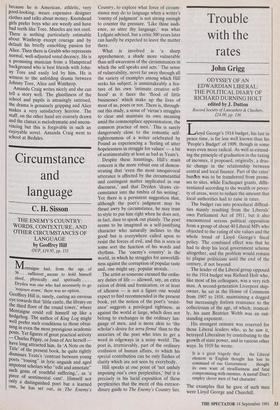Circumstance and language
C. H. Sisson THE ENEMY'S COUNTRY: WORDS, CONTEXTURE, AND OTHER CIRCUMSTANCES OF LANGUAGE by Geoffrey Hill
OUP, £19.95, pp. 153
Montaigne had, from the age of 36 . . . sufficient means to hold himself
aloof, physically and spiritually . . . . Dryden was one who had necessarily to go 'toujours avant,' there was no option.
Geoffrey Hill is, surely, casting an envious eye towards that 'little castle, the library on the third floor of the round tower,' where Montaigne could roll himself up like a hedgehog. The author of King Log might well prefer such conditions to those obtai- ning in even the most prestigious academic posts. Yet figures of great practical activity — Charles Peguy, or Joan of Arc herself— have long attracted him. In 'A Note on the Title' of the present book, he quite rightly dismisses Yeats's 'contrast between young poets "tossing" in lyric anguish and aged impotent scholars who "edit and annotate" such gems of youthful suffering,', as 'a piece of sentimental cant'. Himself not only a distinguished poet but a learned one, he has set out, in The Enemy's Country, to explore what force of circum- stance may do to language when a writer's `enemy of judgment' is not strong enough to counter the pressure. 'Like thine audi- ence, so utter thy language,' was what Lydgate advised, but a critic 500 years later can hardly be expected to leave the matter there.
What is involved is 'a sharp apprehension, a shade more vulnerable than self-awareness of the circumstances in which the self speaks and acts.' The sense of vulnerability, never far away through all the variety of examples among which Hill seeks his subject, is unmistakeably a fea- ture of his own 'intimate creative self- hood' as it faces the 'flood of little businesses' which make up the lives of most of us, poets or not. There is, through- out this study, a sense of 'virtue's struggles to clear and maintain its own meaning amid the commonplace approximation, the common practice of men.' This is surely dangerously close to the romantic self- righteousness of a writer celebrated by Pound as experiencing a 'feeling of utter hopelessness in struggle for values' — a bit of sentimentality at least as bad as Yeats's. Despite these hauntings, Hill's main concern is the more robust one of demon- strating that 'even the most unequivocal utterance is affected by the circumstantial and contingent matter implicated in our discourse,' and that Dryden 'draws cir- cumstance into the timbre of his writing'. Yet there is a persistent suggestion that, although the poet's judgment may be thrust awry by circumstance, he may trust to style to put him right when he does not, in fact, dare to speak out plainly. The poet seems to be imagined as a self-justifying character who naturally inclines to the good but is everywhere called upon to resist the forces of evil, and this is seen in some sort the function of his words and rhythms. The 'enemy's country' is the world, in which he struggles for unworldli- ness against the corruption of popular taste and, one might say, popular morals.
The artist as someone excused the ordin- ary duties of life — allowed, say, an extra ration of drink and fornication, or at least of idleness — is not a figure one would expect to find recommended in the present book, yet the notion of the poet's 'resist- ance' suggests a privileged rightness, as against the world at large, which does not belong to exchanges in the ordinary lan- guage of men, and is more akin to 'the scholar's desire for terra firma' than to the anxieties of the poet who tries to get a word in edgeways in a noisy world. The poet is, irretrievably, part of the ordinary confusion of human affairs, to which his special contribution can be only flashes of clarity which are not seen by everybody.
Hill speaks at one point of 'not unduly imposing one's own perplexities,' but it is precisely in his lucid exposition of these perplexities that the merit of this extraor- dinary guide to The Enemy's Country lies.


















































 Previous page
Previous page